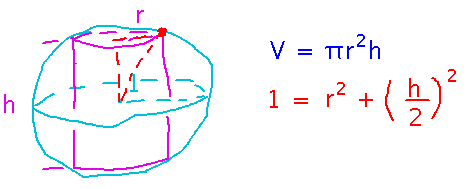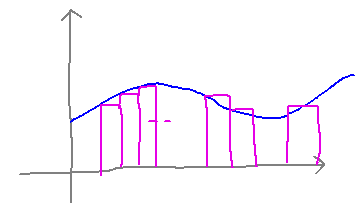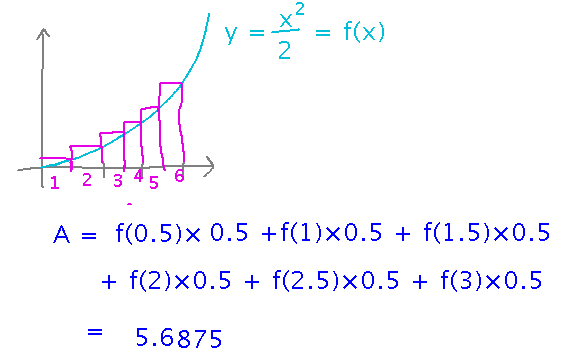Questions?
Cylinder-in-Sphere
How to set up the cylinder-in-sphere problem in problem set 10?
Scenario is a cylinder of unknown radius and height, that must fit into a sphere of radius 1. This imposes constraints on radius and height.
The formula for the volume of a cylinder gives you an objective function to maximize.
Now think about coming up with equations for the constraints. The key observation is that the corners of the cylinder touch the sphere, so those corners are distance 1 (the sphere’s radius) from the center. Then the lines from the center to the corner of the cylinder, the corner to the cylinder’s axis, and along the axis form a right triangle that provides the constraint:

Lower and Upper Sums
What are these ideas from the reading?
When you approximate the area under a graph as a sum of areas of rectangles, you could pick rectangles to consistently stick above the graph, or to consistently lie below (or to not consistently do either). In the first case the area of the rectangles is an upper bound on the area under the graph, i.e., an “upper sum.” In the second case, the rectangles give a lower bound on the area under the graph, a “lower sum.”

Sums and Areas
Latter part of section 5.1, start of 5.2
Key Idea(s)
Riemann sum (sum of function values times rectangle widths) as an estimate of the area under a graph.
Approximate Area
Based on Example 5.4.
Estimate the area under the graph of y = x2/2 between x = 0 and x = 3 using 6 intervals.
Each rectangle is half a unit wide. Making the right sides of the rectangles touch the graph gives us heights, then just multiply height times width and add up the results:

In summation notation, this is a typical Riemann sum:

How about 600 intervals? Use the same idea, except the bound on the summation and the width of the rectangles will be different. And don’t try to evaluate and add up all the areas by hand, use the ideas from yesterday to simplify the sum into a closed form first.
Problem Set
See handout for details.
Next
Riemann sums and definite integrals.
Remainder of section 5.2